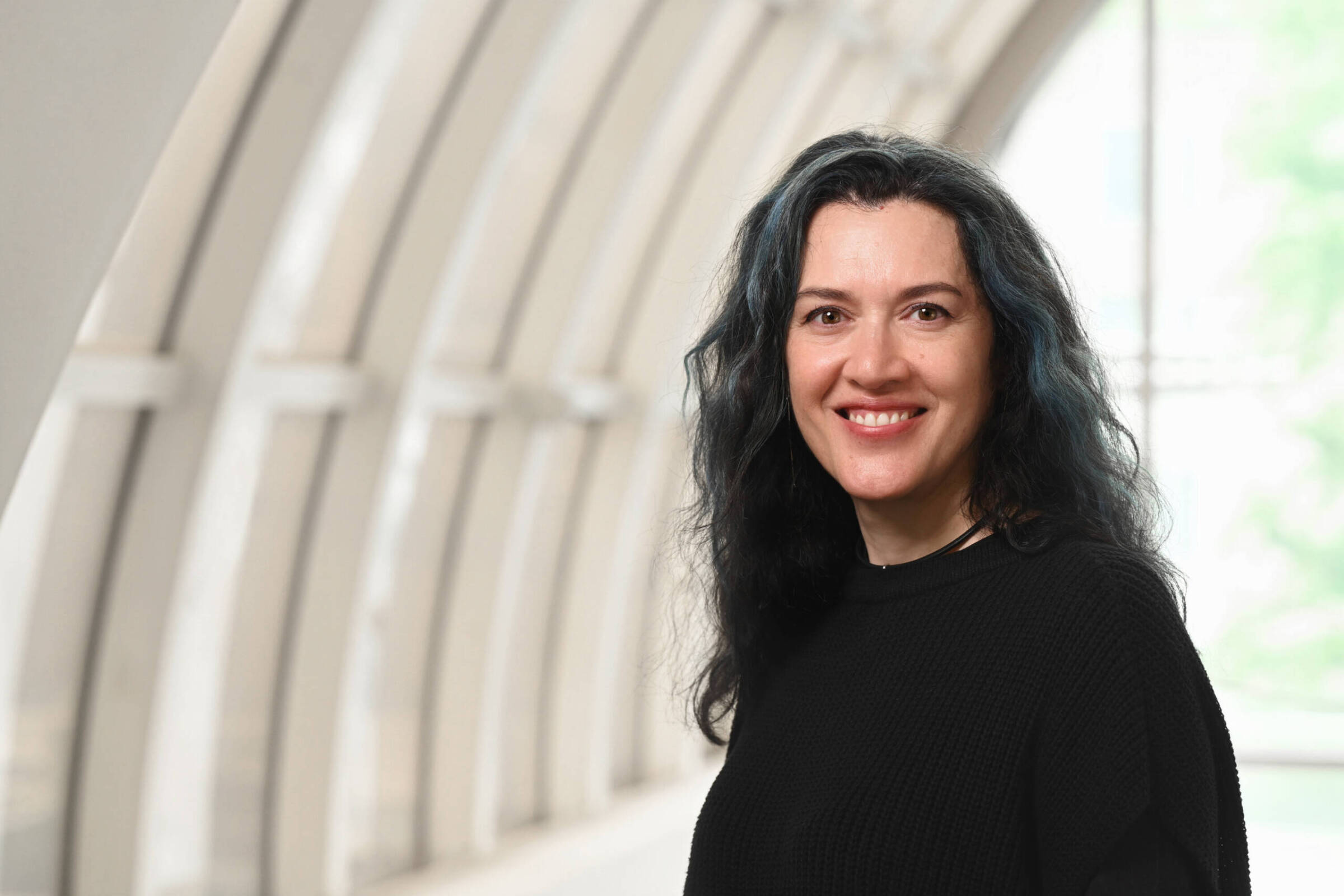"Vanishing Breed" of Researchers Recognized by HHMI
One clinical scientist selected in New York region: Rockefeller’s Robert Darnell
Robert B. Darnell, M.D., Ph.D., whose bench-to-bedside studies at Rockefeller University have uncovered new insights about how the brain normally works and about tumor immunity, is one of the 12 physician-scientists selected for a new Howard Hughes Medical Institute (HHMI) program spotlighting the value of relating basic research discoveries to improving medical therapy.
The only physician-scientist in the New York tri-state area appointed to this new group of HHMI investigators, Darnell focuses on a rare group of brain diseases that arise after the body mounts a successful attack against tumors elsewhere in the body. Information gleaned from these studies sets the stage for developing further clinical insight into tumor immunity, autoimmune disease, and new aspects of brain and cancer biology.
Darnell serves as physician and associate program director at Rockefeller University’s 40-bed research hospital, and is professor and head of the University’s Laboratory of Molecular Neuro-Oncology
In addition to his “bench and bedside research,” Darnell is a mentor to young physician-scientists. Many of his graduate students participate in the highly rated Tri-Institutional M.D.-Ph.D. Program of The Rockefeller University, Weill Medical College of Cornell University and Sloan-Kettering Institute. He teaches at Memorial Sloan-Kettering Cancer Center, where he is an attending physician in the Neuro-Oncology In-Patient Service.
“Physician-scientists are crucial for maximizing our ability to convert the great new scientific discoveries into improved health,” says Barry Coller, M.D., physician-in-chief at The Rockefeller University Hospital, established in 1910 as the first clinical research hospital in the United States.
“Over 100 years ago, Rockefeller University was founded to explore disease treatment as well as basic biological mechanisms of health and disease,” Coller adds. “We applaud the HHMI program and are delighted that Bob Darnell is being recognized as one of the leaders in molecular medicine.”
In patient studies at Rockefeller University’s research hospital, Darnell and the university’s other physician-scientists evaluate findings from basic research studies in the laboratory to determine their relevance to understanding health and disease.
“Translational research is a two-way street,” says Darnell. “Our clinical experiences with patients inspire many of the studies in the laboratory using test-tubes, cell cultures and animal models to study human disease.”
In his studies at the Rockefeller Hospital, Darnell and his research team study patients with a group of rare brain diseases called paraneoplastic neurologic disorders (PNDs). These diseases occur when tumor cells in areas of the body outside the brain mistakenly produce proteins, or antigens, that normally occur only in the brain.
The immune defense system typically does not recognize or react to proteins in the brain. In people with PND, the body’s immune system’s attack on the neuronal proteins mistakenly produced in their tumors spreads across a protective layer of tissue called the blood-brain barrier. The underlying tumors commonly are breast, ovarian and lung cancer. The result is autoimmune damage to brain cells.
The immune system’s response is the best understood instance of naturally occurring effective tumor immunity, explains Darnell.
“The PNDs offer us the opportunity to work backward from patients presenting to the physician with brain disease, to see what is otherwise invisible – an effective immune attack against cancer,” he says.
It is only once the immune system attack spreads to the brain that clinical problems develop for the patient. In specific regions of the brain, cells degenerate as a result of the autoimmune attack, in a manner analogous to what is believed to take place in other neurologic autoimmune disorders such as multiple sclerosis.
Darnell and his colleagues used the serum from patients to clone “cDNAs” – molecules that contain the genetic information encoding the brain-cancer proteins – and thereby bring the power of modern molecular biology to bear on studying the amazing clinical phenomenon evident in PND.
“These cDNAs have enabled us to study the disease-causing mechanism of PND, which has yielded a new set of insights into tumor immunity, with the promise of making important discoveries about autoimmune brain disease – such as multiple sclerosis – directly in front of us,” says Darnell.
According to Darnell, the study of the PNDs has been equally powerful as a tool for basic science discovery.
“Here, nature has pointed out for us cDNAs that are uniquely expressed in brain cells, and aberrantly used by cancer cells,” he says. “This has again yielded new insights, in this case into what makes a neuron different from other cells such as those found in the liver, kidney or spleen.”
For example, Darnell’s team found that several sets of PND proteins bind to RNA, the molecules that carry genetic information from the DNA in a body cell’s nucleus to its protein-making machinery. These studies have led a burgeoning field of research, in which it is becoming apparent that such RNA-binding proteins play critical roles in both brain function and brain disease.
Study of a PND antigen called Nova by Darnell and his colleagues Kate Dredge, B.Sc., Giovanni Stefani, M.D., and Kirk Jensen, Ph.D., for example, has led to new understanding of unique ways in which neurons use RNA. At the same time, studies by Darnell and his colleague and wife, Jennifer Darnell, Ph.D., of the related RNA-binding protein FMRP have yielded insight into how errors in RNA binding lead to fragile X mental retardation.
“In the future, because the PND antigens are produced by cancer cells, studying the function of these brain-cancer proteins may also put us directly en route to understanding new aspects of cancer biology,” Darnell says.
“The Rockefeller University Hospital is a unique modern hospital for cutting-edge translational research,” he adds. “We have the opportunity to take information from a rare set of diseases to make progress in understanding more general applications this may have to humans. We want to pursue our science back to where it came from – human disease.”
In studies of one form of PND called paraneoplastic cerebellar disorder (PCD), which is associated with breast and ovarian cancers, patients suffer from severe ataxia – they cannot coordinate any of the muscles in their bodies, which makes it difficult to walk, talk and eat. Because the autoimmune brain attack is directed against only one part of the brain, the cerebellum, these individuals are perfectly aware and retain their cognitive abilities.
In studies performed at the Rockefeller Hospital, Darnell, working with his colleague Matthew Albert, M.D., Ph.D., found that patients with PCD harbor “killer” T cells specific for the brain-tumor PND antigenexpressed in these patients’ gynecologic tumors, and these killer T cells are the likely mediators of tumor immunity. Darnell hypothesizes that killer T cells are at least partly responsible for the brain degeneration as well, having found these immune cells in the cerebrospinal fluid of women suffering from the disease.
Further study of PCD patients led to the finding that cell suicide by tumor cells serves as a potent means by which a dying cell signals that something is wrong to the immune system, thereby triggering the antitumor immune response. In small-scale clinical research trials that are going to begin at the Rockefeller Hospital studying rostate cancer patients, Darnell and colleagues are beginning an effort to understand how the tumor immunity evident in PND patients may be extended to cancer patients in general.
Research by Darnell’s team – and other groups led by physician-scientists at Rockefeller – exemplifies the tradition of patient-based research pioneered at Rockefeller and looks ahead to the era of “molecular medicine,” characterized by personalized healthcare tailored to the genetic roots of disease.
“Translational medicine depends on clinical investigators, so it is vital that we provide an environment to encourage young physicians and scientists to choose a career in clinical investigation,” says Coller.
The hurdles facing young researchers, according to an Institute of Medicine report in 2000, include large financial debts upon completing professional training, a relatively late start in a research career due to the many years needed for clinical training, and clinical research’s low prestige at some medical schools.
Darnell received the B.A. in biology and chemistry from Columbia University in 1979 and both the M.D. and the Ph.D. in molecular biology in 1985, at the Washington University School of Medicine.
After serving as intern and resident in internal medicine at Mt. Sinai Hospital in New York City and then resident and chief resident in neurology at New York Hospital, he joined Rockefeller University in October 1992.
Five years later, he was promoted to associate professor, and three years after that to full professor. He holds the rank of physician at the Rockefeller University Hospital, where he has been associate program director of the General Clinical Research Center since 1996. In addition to teaching at Memorial Sloan-Kettering, he has been on the faculty for the Pathogenesis of Neuroimmunologic Diseases at the Marine Biological Laboratory at Woods Hole, Mass. He also has taught at Cold Spring Harbor Laboratories, where he directed the course “Molecular Cloning of Neural Genes” from 1996 to 2000.
He has been honored with the Irma T. Hirschl Career Scientist Award, the Derek Denny-Brown Young Neurological Scholar Award, and a Burroughs-Wellcome Fund Clinical Scientist Award in Translational Research.
About The Rockefeller University Hospital:
The Rockefeller University Hospital is the largest clinical research hospital in the country other than the National Institutes of Health’s Warren G. Magnuson Clinical Center in Bethesda, Md. The Rockefeller Hospital served as the model for the NIH facility which opened in 1953, and similar facilities supported by federal funding at more than 75 medical schools in the United States. Diabetes, heart disease, obesity, schizophrenia and drug addiction are among the disorders currently under study at the hospital.
About The Rockefeller University:
Founded by John D. Rockefeller in 1901, The Rockefeller University was this nation’s first biomedical research university. Today it is internationally renowned for research and graduate education in the biomedical sciences, chemistry, bioinformatics and physics. A total of 21 scientists associated with the university have received the Nobel Prize in medicine and physiology or chemistry. A total of 16 Rockefeller scientists have received the Lasker Awards. Five have been named MacArthur Fellows, and 11 have garnered the National Medical of Science. More than a third of the current faculty are elected members of the National Academy of Sciences.


